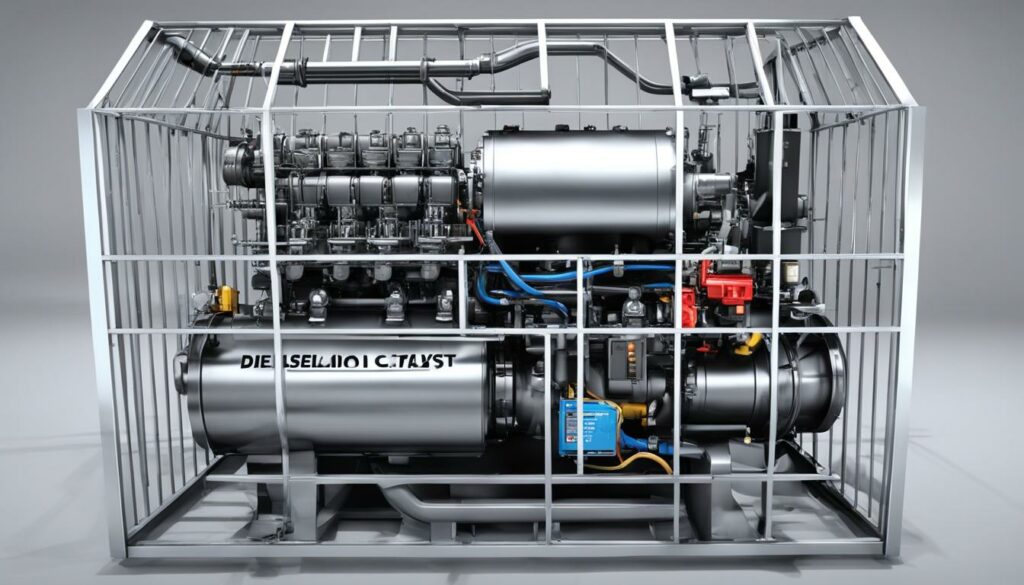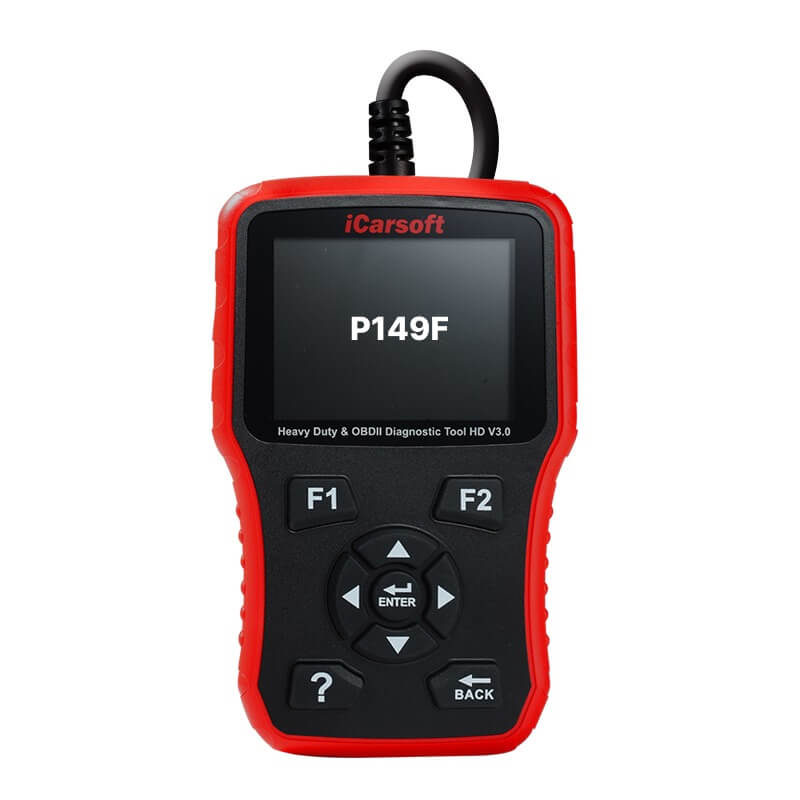P149F – Diesel Oxidation Catalyst Not Ready For Diagnostics
POSTED IN pcodes
Welcome to our article on the P149F diagnostic trouble code, which indicates that the Diesel Oxidation Catalyst (DOC) is not ready for diagnostics. This code is related to the emissions control system and often results in the check engine light being illuminated. If you’re experiencing this issue, it’s important to address it promptly to ensure optimal engine performance and meet emissions standards.
Key Takeaways:
- P149F is a diagnostic trouble code related to the Diesel Oxidation Catalyst not being ready for diagnostics.
- The code is linked to the emissions control system and typically triggers the check engine light.
- Common causes of the P149F code include issues with the DOC, faulty sensors, or problems with the Engine Control Unit (ECU).
- Troubleshooting steps and professional assistance may be necessary to diagnose and repair the P149F code.
- Addressing the P149F code promptly is essential for optimal engine performance and compliance with emissions regulations.
Understanding the P149F Diagnostic Trouble Code
The P149F diagnostic trouble code is specifically related to the Diesel Oxidation Catalyst (DOC) not being ready for diagnostics. This code is an indicator of an issue within the vehicle’s emissions control system. When the P149F code appears, the check engine light will be illuminated to alert the driver of the problem.
Addressing the P149F code promptly is essential to ensure the proper functioning of the vehicle and to comply with emissions regulations. To diagnose the exact cause of the P149F code, a comprehensive engine diagnostics process will be necessary. This process involves a series of tests and inspections to identify any issues within the emissions control system.
During the engine diagnostics, the technician will examine the Diesel Oxidation Catalyst and its associated components, including sensors and wiring. They will also examine other elements of the emissions control system that may contribute to the code’s appearance. By conducting these tests, the technician can pinpoint the specific problem causing the P149F code and determine the appropriate course of action for repairs.
It is important not to ignore the P149F code, as it can affect both the performance of the vehicle and its compliance with environmental regulations. By addressing the issue promptly and following the engine diagnostics process, drivers can ensure their vehicles operate optimally while minimizing their impact on the environment.
Buy tested tuning file for Adblue / EGR / DPF / Adblue off now!
Image: The P149F Diagnostic Trouble Code – Understanding the Diesel Oxidation Catalyst
Symptoms of a P149F Code
When a vehicle displays the P149F diagnostic trouble code, several symptoms may be experienced. It is important to be aware of these symptoms as they can indicate a problem with the vehicle’s emissions control system and diesel oxidation catalyst. The most common symptom is the illumination of the check engine light on the dashboard, serving as an alert that something requires attention. This is a clear indication that there is an issue that needs to be addressed promptly.
Along with the check engine light, there may be a noticeable decrease in engine performance or efficiency. The vehicle may not run as smoothly as it used to, and there may be a lack of power or responsiveness. This can affect the overall driving experience and compromise the vehicle’s functionality.
In addition, the P149F code can also result in an increase in emissions from the exhaust. This means that the vehicle may be releasing pollutants into the environment at a higher rate than normal, which can be detrimental to air quality and may cause the vehicle to fail emissions tests.
If any of these symptoms are present, it is important to have the vehicle inspected and diagnose the cause of the P149F code. Ignoring these symptoms may lead to further damage to the emissions control system or other engine components, resulting in more costly repairs down the line. Taking prompt action is crucial to ensuring the vehicle’s performance, reducing emissions, and maintaining compliance with emissions regulations.
“Being aware of the symptoms associated with the P149F code allows drivers to take proactive measures and address the issue promptly, ensuring optimal engine performance and reducing emissions.”
Symptoms of a P149F Code
| Symptom | Description |
|---|---|
| Check Engine Light Illuminates | The check engine light on the dashboard is activated, indicating a problem with the vehicle’s emissions control system. |
| Decreased Engine Performance | The vehicle may experience a noticeable decrease in engine performance, resulting in reduced power and responsiveness. |
| Increase in Emissions | There may be a detectable increase in emissions from the exhaust, leading to environmental concerns and potential compliance issues. |
Common Causes of the P149F Code
The P149F diagnostic trouble code can be triggered by various issues within the emissions control system, including the diesel oxidation catalyst (DOC), sensors, the engine control unit (ECU), software, and wiring problems. Identifying the specific cause of the P149F code requires a thorough inspection and diagnostic process.
Some of the common causes of the P149F code include:
- Malfunctioning Diesel Oxidation Catalyst (DOC): A faulty DOC can prevent the emissions control system from functioning properly, resulting in the P149F code.
- Faulty Sensor Related to Emissions System: If a sensor responsible for monitoring the emissions system malfunctions, it can trigger the P149F code.
- Problem with the Engine Control Unit (ECU): Issues with the ECU, such as a software glitch or a faulty component, can lead to the P149F code.
- Software Issue: Sometimes, a software malfunction within the emissions control system can trigger the P149F code.
- Wiring Problem: Damaged or disconnected wiring can interfere with the proper functioning of the emissions control system, causing the P149F code to appear.
Accurately determining the underlying cause of the P149F code requires a comprehensive inspection and diagnostic assessment, allowing for effective repairs or replacements to be made.
Quote:
“The P149F code can be caused by various factors, including a malfunctioning diesel oxidation catalyst, faulty sensors, issues with the engine control unit, software malfunctions, and wiring problems. Performing a thorough inspection and diagnostic process is crucial in identifying the specific cause and resolving the issue.” – Expert Mechanic
Troubleshooting Steps for the P149F Code
To address the P149F diagnostic trouble code related to the emissions control system and the diesel oxidation catalyst (DOC), a series of troubleshooting steps can be taken. These steps will help identify and resolve the issue causing the code. Here are the recommended troubleshooting steps:
- Perform a Visual Inspection: Start by visually inspecting the components of the emissions control system, including the diesel oxidation catalyst, sensors, and wiring. Look for any signs of damage, corrosion, or loose connections. Address any issues found during the inspection.
- Scan the Engine Control Unit (ECU): Use a diagnostic tool to scan the vehicle’s ECU for any additional error codes that may be present. This step will help identify any underlying issues that might contribute to the P149F code. If other codes are detected, address them accordingly.
- Reprogram or Replace the ECU: If necessary, reprogramming or replacing the ECU might be required. This step ensures the ECU’s proper functioning and can help resolve the P149F code if it is caused by a software or programming issue.
- Consider Diesel Oxidation Catalyst Replacement: If no other issues are found during the troubleshooting process, and the P149F code persists, replacing the diesel oxidation catalyst may be necessary. Consult a professional technician or mechanic for guidance and assistance in selecting and installing a suitable replacement.
Taking these troubleshooting steps can help diagnose and resolve the P149F code, ensuring proper functioning of the emissions control system and diesel oxidation catalyst.

| Troubleshooting Steps for P149F Code |
|---|
| Step 1: Perform a visual inspection of emissions control system components. |
| Step 2: Scan the vehicle’s ECU for additional error codes. |
| Step 3: Reprogram or replace the ECU if necessary. |
| Step 4: Consider replacing the diesel oxidation catalyst. |
Repair Options for the P149F Code
When faced with the P149F diagnostic trouble code, there are several repair options available to address the issue with the emissions control system and the Diesel Oxidation Catalyst (DOC). The specific repair option will depend on the cause of the code and the extent of the damage. It is highly recommended to consult with a professional technician to accurately diagnose the problem and determine the best course of action for repairs.
Replacement of the Diesel Oxidation Catalyst (DOC)
If the P149F code is triggered due to a malfunctioning DOC, the recommended repair option is to replace the catalyst. The DOC plays a crucial role in reducing emissions and ensuring proper functioning of the emissions control system. A faulty or damaged DOC can lead to increased emissions and decreased engine performance. Replacing the DOC will restore the system’s functionality and help meet emissions standards.
Repair or Replacement of Faulty Sensors or Wiring
Faulty sensors or wiring related to the emissions control system can also trigger the P149F code. In such cases, it is necessary to repair or replace the affected components. Sensors play a critical role in providing data to the engine control unit (ECU) for optimal engine performance and emissions control. Damaged wiring can disrupt the communication between the sensors and the ECU, leading to the code being triggered. An experienced technician can identify the faulty components and carry out the necessary repairs or replacements.
Reprogramming or Replacement of the Engine Control Unit (ECU)
In some situations, the P149F code may be caused by a problem with the ECU. The ECU is responsible for managing various engine functions, including emissions control. If a software issue is detected or the ECU itself is faulty, reprogramming or replacing the unit may be necessary to resolve the code. Reprogramming involves updating the ECU’s software with the latest version or specific settings to address the issue. In more severe cases, the ECU may need to be replaced entirely.
Consulting with a Professional Technician
Given the complexity of the P149F code and the various repair options, consulting with a professional technician is crucial for an accurate diagnosis and effective repairs. A trained technician will have the expertise, diagnostic tools, and access to OEM resources to identify the root cause of the code and recommend the most appropriate repair option. Using their experience, technicians can ensure that the repairs are carried out correctly, minimizing the risk of future issues and ensuring compliance with emissions regulations.
| Repair Option | Description |
|---|---|
| Replacement of the Diesel Oxidation Catalyst (DOC) | Replace the malfunctioning DOC to restore proper emissions control and engine performance. |
| Repair or Replacement of Faulty Sensors or Wiring | Repair or replace sensors or wiring related to the emissions control system to ensure accurate data transmission and functionality. |
| Reprogramming or Replacement of the Engine Control Unit (ECU) | Reprogram or replace the ECU if software issues or ECU malfunctions are causing the P149F code. |
| Consulting with a Professional Technician | Seeking expert advice and assistance to accurately diagnose the issue and determine the most suitable repair option. |
Professional Assistance for P149F Code
When facing the P149F diagnostic trouble code, it is advisable to seek professional assistance for an accurate diagnosis and repair. A qualified technician will have the necessary expertise and equipment to properly diagnose the cause of the code and recommend the appropriate repairs.
If professional assistance is unavailable, an alternative solution could be the permanent removal of the P149F code by uploading the Engine Control Unit (ECU) file to a specialized portal. This option should only be pursued if no other repair options are available or if the vehicle is unable to meet emissions standards.

Conclusion
In conclusion, the P149F diagnostic trouble code indicates a problem with the Diesel Oxidation Catalyst (DOC) not being ready for diagnostics. This code is related to the emissions control system and should be addressed promptly to ensure optimal engine performance and compliance with emissions regulations.
The common causes of the P149F code include a malfunctioning DOC, faulty sensors, or issues with the Engine Control Unit (ECU). To resolve the issue, a thorough troubleshooting process should be carried out to identify the exact cause and determine the appropriate repair options.
Seeking professional assistance is highly recommended to ensure an accurate diagnosis and proper repair of the P149F code. A qualified technician will have the necessary expertise and equipment to effectively address the issue and restore the vehicle’s emissions control system to its optimal functioning.
FAQ
What does the P149F code indicate?
The P149F code indicates that the Diesel Oxidation Catalyst (DOC) is not ready for diagnostics. This code is related to the emissions control system and typically results in the check engine light being illuminated.
How does the P149F code affect my vehicle?
The P149F code can affect your vehicle by causing a decrease in engine performance or efficiency. It may also result in increased emissions from the exhaust.
What are some common causes of the P149F code?
Some common causes of the P149F code include a malfunctioning Diesel Oxidation Catalyst (DOC), faulty sensors related to the emissions system, or a problem with the vehicle’s Engine Control Unit (ECU).
What should I do if I have the P149F code?
If you have the P149F code, it is recommended to have your vehicle inspected by a professional technician. They will be able to diagnose the exact cause of the code and recommend the necessary repairs or replacements.
Can I drive my vehicle with the P149F code?
It is generally not recommended to drive your vehicle with the P149F code. This code indicates an issue with the emissions control system, and driving with this issue can potentially cause further damage to your vehicle and increase emissions.
How can the P149F code be repaired?
The repair for the P149F code will depend on the exact cause of the issue. It may be necessary to replace the Diesel Oxidation Catalyst (DOC), repair or replace faulty sensors, or reprogram or replace the Engine Control Unit (ECU).
Can I fix the P149F code myself?
The P149F code is best diagnosed and repaired by a professional technician who has the necessary expertise and equipment. It is not recommended to attempt to repair this code yourself unless you have the proper knowledge and tools.


